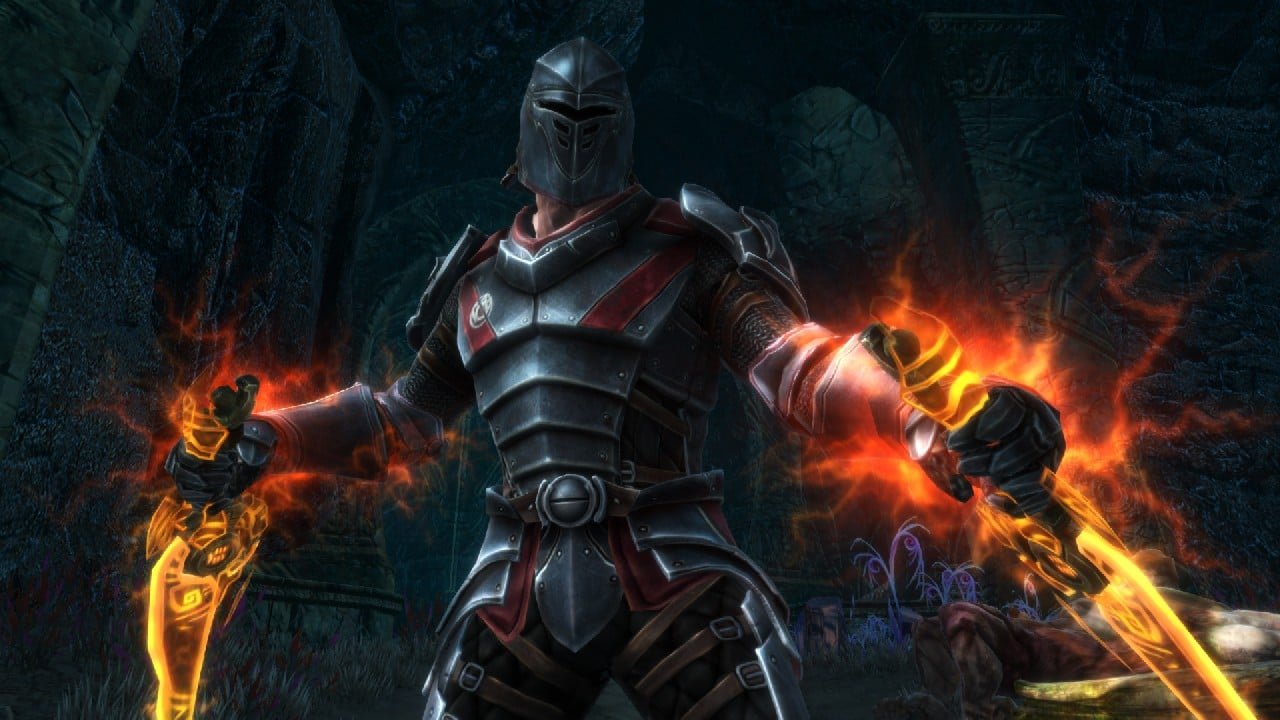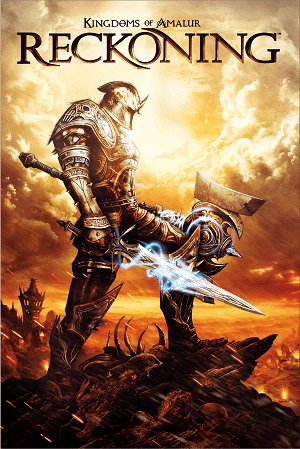More Lost Hours of Your Life
When Kingdoms of Amalur: Reckoning was first announced, there was a lot of potential on show thanks to the big names involved, but there was also a lot of doubt. An RPG in an FPS market? A new IP going up against the current monster, the Elder Scrolls series? Art direction that was colorful instead of dark and gritty? Could this possibly survive in a market that has defined anything successful as needing to adhere to Modern Warfare or Skyrim? The answer, at least in the case of this game, is a resounding yes.
Destiny Forgot You
Kingdoms of Amalur: Reckoning begins with players (after some character creation) finding themselves atop a pile of bodies, and quickly realizing that they are A) the first successful resurrection in a long line of failed experiments and B) removed from the tapestry of fixed, linear destiny as a result. What follows next is a long, in depth RPG that explores the lore and culture of a world where everyone except you has an unchangeable destiny, until you come along and muck things up. It’s also a pretty convenient excuse to allow you to re-spec your character at any time, redistributing skills and talents for a small amount of money from a “Fate weaver” who’s normal function for others is simply to tell them what’s in store for their fate. This is a dense world, with a rich history comparable to typical fantasy novels, but that should be no surprise since a novelist, R.A. Salvatore was involved in the conception of this world’s history, writing 10,000 years worth for both this game and future titles in the Amalur brand. There’s nothing here that’s going to redefine the fantasy genre, but at the same time, the level of lore and turns of the plot represent the genre well and provide enough interest to keep players moving ahead to find out what happens next. Characterization isn’t necessarily the story’s strength, plotting is.
In the graphics department, KoAR goes for something a little bit different. It eschews the more realistic, grimy art direction seen in recent fantasy RPGs like The Witcher, Dragon Age and Skyrim to go for something more baroque. To some that automatically generates associations with Warcraft or Fable, but the art direction, while colorful, is not as exaggerated or cartoony, thanks to the involvement of famed comic book artist and toy maestro Todd McFarlane. It might not look like Peter Jackson’s Lord of the Rings, but then too many fantasy games have worshipped at that house over the last ten years, and it’s refreshing to see a game that looks more like something from a comic book or even the cover of a fantasy novel, rather than the now familiar realistic look of contemporary fantasies. The performance is also reliable, with no severe, consistent drops in frame rate, though it can be occasionally noticeable in more hectic combat situations, and the game occasionally pauses for a split second when moving from one zone into another. On the whole though, Big Huge Games has managed to create a world with a distinct feel that manages to feel both familiar in its fantasy tropes, but still throw enough imagination into the environments that you’ll feel like you’re seeing something new. And really, when was the last time players got to run around in an enchanted forest that looked the part, rather than just some dark woods with a few Orcs running around in them?
The sound department is almost uniformly strong. Audio effects are punchy, almost too punchy in some respects as subwoofers really kick things up a notch when magic comes into play and lightning spells feel like genuine thunder is shaking the room. The audio engineers have made a strong distinction between game effects, such as menu audio effects or the audio cues for picking up objects, versus the world audio, like the clanking of swords and the hurling of fireballs. The voice acting is also up to snuff with a lot of familiar names in the credits including fan favorites like Cam Clark and Simon Templeman bowing in for voice work. For actual delivery of dialog, the directors of the game have decided to go all United Kingdom in their choice of accents with Gnomes sounding largely Scottish, while the Fae are very Irish and humans and Elves get the lion’s share of British accents. Performance is of a generally high calibre, although some players may be surprised at the amount of voiced poetry embedded in the game if they go looking for it. Musically, KoAR errs on the side of games like Dark Souls, choosing to go minimal most of the time, with some hauntingly effective orchestral arrangements sneaking in at odd, unexpected moments. Boss fights, of course, bring on the brass, wind, and percussion instruments for bombastic pieces, but for the most part, the music is surprisingly restrained, coming in and out of the soundscape with an almost staccato sense of rhythm.
The Land of Quests
The best way to describe Kingdoms of Amalur: Reckoning is that a more mature, relaxed God of War got together with Elder Scrolls and had a child. This game shares much of the DNA from both games, though it’s obvious that Skyrim—via the pedigree of Ken Rolston, designer on Morrowind and Oblivion—has the dominant pair of genes. This is an RPG of the Western variety through and through, with many choices, branching dialog, massive areas to explore littered with dungeons, and so many side-quests that you can’t swing the proverbial cat in the room without hitting six hapless NPCs that all need your help. But where most RPGs tend to fumble on the combat—at least when they attempt a more action oriented approach—Amalur manages to nail this with a responsive, surprisingly complex and robust combat system.
First, let’s look at the RPG aspect of things. Ken Rolston once said that if he could tempt players away from the main story with appealing side-quests, he considered his job done. He certainly earned his pay with Kingdoms of Amalur: Reckoning. Like his Bethesda work, Amalur starts off enticingly with a decent number of side-quests and quickly escalates into intimidating to the point of paralysis. This is a game that can be reasonably finished in about 25 hours if you’re sticking mostly to the plot and occasionally indulging in a side-quest here and there, but that balloons well beyond the 100 hour mark if you try to do everything. Quests range from the intriguing and well-structured main quest to fascinating and occasionally even more interesting faction-based quest lines, to small, one shot quests of the MMO variety involving killing X amount of monsters, or fetch and return missions. There’s nothing you haven’t seen here before, but the fundamentals are done right, so while it may not necessarily feel fresh, the sense of story with many of the quests will be enough to keep you going. A ridiculous number of characters offer more than just one-liners, although this is offset by the amount of information—particularly with regards to towns and regions—that they repeat from one character to another.
Systems-wise, the game shares a lot in common with the Elder Scrolls games, including the ability to sneak, pick pockets, get critical hits on unsuspecting enemies, focus on thief, fighter or mage skills, or mix the skills up for a hybrid class of your own devising. Like Elder Scrolls games, the system also allows for crafting, letting players create their own potions, weapons and armor, all of which can potentially be much more powerful than standard loot if players choose to put skill points into these specific disciplines. For veterans of the genre, particularly of Bethesda offerings, all of this is old hat, and, as to be expected, serious dedication to crafting can break the game in terms of difficulty. The average player can expect a reasonable level of difficulty throughout the Kingdoms of Amalur: Reckoning if they ignore most of the content on offer and pursue mostly the story. The obsessive, min/max style RPG player can expect to become a demi-god within a few hours of experimentation with crafting, or, for the lazy, consulting guides on the internet for optimal builds.
And finally, there is the combat. This is where KoAR makes its most dramatic departure from the fantasy RPGs that gamers are used to. Rather than the slower paced combat of a Bethesda game, or the frantic clicking of a Blizzard game, KoAR looks to 3rd
person action games such as God of War or Ninja Gaiden and introduces a more stately, somewhat slower version of the combat from these games that feels different and blindingly responsive compared to what we’re used to in the genre. This is still an RPG, so players can pick skills as they level up, but those skills can directly translate into new combat moves, and new combos, which are easy to execute thanks to a combination of one button, “timed press” combat, and different talents/spells assigned to the face buttons. Whether you just want to lumber in swinging a heavy hammer and absorb punishment, dart in and out like a dervish with something resembling a Klingon Bat’leth, or maintain your distance and just hurl lightning and fireballs, KoAR covers all the preferred modes of combat and does it in a responsive, action-game style that will surprise people with how fast and fun it feels in a fantasy RPG. As mentioned earlier, the best part of this entire system is that in keeping with the “fate-less one” conceit of the game, players can re-spec their character at any time, redistributing talents and skills to try out other classes if they decide they don’t like being a sneak thief after all and want to try magic for a change. It’s a novel design decision to not “trap” a player in a character class and live with skill choices they might have made in haste or ignorance, and encourages even more experimentation on the part of the player to find that perfect hybrid class with all the skills they want.
The game, in some ways, also mimics the excess of The Elder Scrolls in its almost unnecessary detail. You can go into most homes, you can rifle through armoires, drawers and bookshelves and you can always find something to steal. It might be a book or worthless pair of shoes you’ve already seen dozens of times, but it’s there for you to take if you’re the kleptomaniacal sort. Even bodies remain in the game world for some time after death. The one thing KoAR doesn’t allow you to do that Elder Scrolls games do, is pick up objects, randomly place them where you like, and have the game remember that placement for all time. In some regards, this likely accounts for the surprising stability of the game. This is a game you can “trust.” Unlike Skyrim, Amalur enjoys a sturdy amount of reliable performance. Like any game of huge scope, it’s not completely bug free, but KoAR’s bugs are just that; minor things like audio occasionally repeating, or quests that, upon completion, stay active in your quest log. Quests aren’t broken, important NPCs don’t go missing, and the game doesn’t crash or experience degrading performance as time passes. In many ways, this shows just how much stability a game can enjoy if the designers aren’t insistent that every book can be alphabetically sorted in a bookshelf by the player, and every dead body can placed on benches or used as décor on a table at home. In forgoing the ability for players to manipulate the world in small, meaningless ways, they have achieved a level of stability that no Elder Scrolls game has ever enjoyed at launch, despite the fact that the amount of content in both games is comparable.
In the end Kingdoms of Amalur: Reckoning might just be that most rare of things, a fantasy RPG that even action gamers can get into. The RPG elements still have depth and complexity, but the combat is fast paced enough that a twitch-based gamer can appreciate and enjoy it. The story doesn’t do anything new, but manages to keep the plot interesting enough that players are motivated to see it through to the end. The only real failing the game has is that the numerous quests can start to feel repetitive if you obsessively go through ALL of them, but that, of course, is a choice left up to the player. KoAR is a new fantasy IP that does a lot of things right, and hopefully we’re looking at the start of a new series that will add its unique flavor of action and fantasy to a genre in need of more variety. If you’re a fan of RPGs, give this one a chance. If you’re a fan of action games that always thought RPGs were too slow paced, this is probably the game to finally dip your toe into the pool with.






